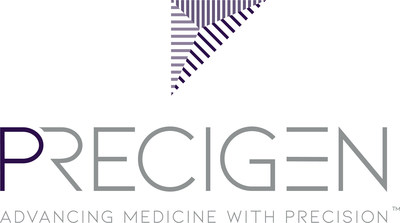Precigen Announces Clearance of IND to Initiate Phase 1/1b Study for PRGN-3007 UltraCAR-T® in Advanced ROR1+ Hematological and Solid Tumors
- PRGN-3007 is the first of the next generation UltraCAR-T, incorporating intrinsic PD-1 checkpoint inhibition in addition to the three effector genes used in the first generation UltraCAR-T technology -
|
| [26-October-2021] |
|
GERMANTOWN, Md., Oct. 26, 2021 /PRNewswire/ -- Precigen (Nasdaq: PGEN), a biopharmaceutical company specializing in the development of innovative gene and cell therapies to improve the lives of patients, today announced that the US Food and Drug Administration (FDA) has cleared the Investigational New Drug (IND) application to initiate the Phase 1/1b clinical trial of PRGN-3007 in advanced receptor tyrosine kinase-like orphan receptor 1-positive (ROR1+) hematological and solid tumors. PRGN-3007 is a first-in-class investigational therapy based on the next generation of Precigen's UltraCAR-T® platform and incorporates intrinsic programmed cell death protein 1 (PD-1) blockade. This first-in-human investigator-initiated study of PRGN–3007 will be conducted in collaboration with the H. Lee Moffitt Cancer Center & Research Institute. ROR1 is overexpressed in various cancers with minimal expression in healthy adult tissues. ROR1 is aberrantly expressed in multiple hematological tumors, including chronic lymphocytic leukemia (CLL), mantle cell leukemia (MCL), acute lymphoblastic leukemia (ALL), and diffuse large B-cell lymphoma (DLBCL) and solid tumors, including breast adenocarcinomas encompassing triple negative breast cancer (TNBC), pancreatic cancer, ovarian cancer, and lung adenocarcinoma. PRGN-3007 UltraCAR-T is an investigational multigenic, autologous CAR-T cell therapy utilizing Precigen's clinically validated advanced non-viral gene delivery system and the well-established overnight, decentralized manufacturing process. Precigen has further advanced the UltraCAR-T platform to address the inhibitory tumor microenvironment by incorporating intrinsic checkpoint blockade without the need for complex and costly gene editing techniques. PRGN-3007 is engineered using a single multicistronic transposon plasmid to simultaneously express a chimeric antigen receptor (CAR) targeting ROR1, membrane-bound interleukin–15 (mbIL15), a kill switch, and a novel mechanism for the intrinsic blockade of PD-1 gene expression. The PD-1/programmed death ligand 1 (PD-L1) pathway plays a vital role in how tumor cells evade immune response. While the blockade of the PD-1/PD-L1 pathway has demonstrated considerable benefit for treating various cancers, the use of systemic checkpoint inhibitors can lead to side effects associated with autoimmune response. The innovative design of PRGN-3007, where the blockade of PD-1 expression is intrinsic and localized to UltraCAR-T cells, is aimed at avoiding systemic toxicity and the high cost of checkpoint inhibitors by eliminating the need for combination treatment. The Phase 1/1b clinical trial is an open-label study designed to evaluate the safety and efficacy of PRGN-3007 in patients with advanced ROR1+ hematological (Arm 1) and solid (Arm 2) tumors. The target patient population for Arm 1 includes relapsed or refractory CLL, relapsed or refractory MCL, relapsed or refractory ALL, and relapsed or refractory DLBCL. The target patient population for Arm 2 includes locally advanced unresectable or metastatic histologically confirmed TNBC. The study will enroll in two parts: an initial 3+3 dose escalation in each arm followed by a dose expansion at the maximum tolerated dose (MTD). Arm 1 and Arm 2 will enroll in parallel. "ROR1 is an attractive target for treatment of multiple hematological and solid tumors due to its high expression in cancer and minimal expression in healthy adult tissues," said Javier Pinilla-Ibarz, MD, PhD, Senior Member, Lymphoma Section Head and Director of Immunotherapy, Malignant Hematology Department, H. Lee Moffitt Cancer Center & Research Institute, and Principal Investigator for the PRGN-3007 clinical study. "Preclinical studies of PRGN-3007 UltraCAR-T indicate the potential for improved efficacy by specific targeting of ROR1 combined with intrinsic blockade of PD-1 expression and we look forward to investigating the potential in this first-in-human clinical study." "ROR1 expression is thought to be a potential adverse prognostic factor in TNBC patients," said Hatem Soliman, MD, Medical Director of the Clinical Trials Office, H. Lee Moffitt Cancer Center & Research Institute, and Principal Investigator for the TNBC cohort of PRGN-3007 clinical study. "Given the aggressive nature of TNBC and the need for additional treatment options, we are eager to investigate PRGN-3007 in this setting." "This is the first study of our next generation UltraCAR-T, which adds checkpoint blockade to our non-viral, multigenic UltraCAR-T platform," said Helen Sabzevari, PhD, President and CEO of Precigen. "PRGN-3007 eliminates the need to combine an antigen-specific CAR-T with a separate checkpoint inhibitor, which has the potential to avoid systemic toxicity and reduce cost. This new study is a big step toward our UltraCAR-T library approach, which aims to deliver personalized autologous UltraCAR-T therapies based on a patient's cancer indication and biomarker profile using overnight manufacturing at the patient's medical center." About Receptor Tyrosine Kinase-like Orphan Receptor 1 (ROR1) Precigen: Advancing Medicine with Precision™ Trademarks Cautionary Statement Regarding Forward-Looking Statements References
For more information, contact:
SOURCE Precigen, Inc. |
|||||||||||||||||||||||||||||||
Company Codes: NASDAQ-NMS:PGEN |





